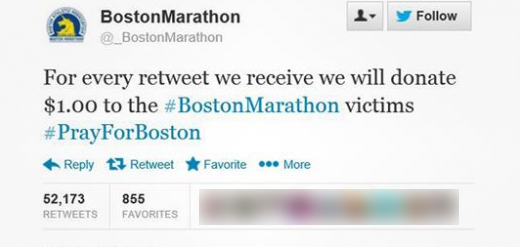Don’t Fall for the Internet’s Many Boston Marathon Scams
Scammers have taken to the internet to defraud those looking to learn more about or donate to those impacted by the attack at the Boston marathon, warns the Department of Homeland Security. According to a release from the DHS’s Computer Emergency Readiness Team:
Malicious actors are exploiting the April 15 explosions at the Boston Marathon in attempts to collect money intended for charities and to spread malicious code. Fake websites and social networking accounts have been set up to take advantage of those interested in learning more details about the explosions or looking to contribute to fundraising efforts.
Almost instantly after the bombs exploded, people began registering for domains related to the attack, with URLs like 2013bostonbombing.com or bostonmarathon2013.net. The goal in hosting these sites is either to profit from the resale of the domain, to serve ads to those who visited looking for more information, or to spread malware. A Twitter account called @_BostonMarathon, easily mistaken for the official @BostonMarathon account, cropped up shortly after the attack, and said it would donate $1 for every Retweet it received. Twitter shut down the account, but not before tens of thousands of people happily hit Retweet, thinking they’d done something simple for the victims, The Boston Globe notes.
For those looking to tell apart the real and the fake, the DHS offered some advice:
US-CERT recommends that all persons interested in donating funds should go directly to established charities. Exercise caution when interacting with social media accounts that claim to represent the best interests of those involved in the incident, and directly visit established news sources rather than conducting general search engine queries, as it can be difficult to tell which search results may lead to scam sites.
The Massachusetts Attorney General’s office also suggested people look to established charities, like the One Fund set up by the Mayor and the Governor in the wake of the attack. Basically, don’t give your money too readily and be aware that local tragedies do not prevent the horrid people from the internet at large from doing their worst. Oh, and don’t go to the 130 websites on this list, assembled by Boston Business Journal. Maybe go visit some therapy dogs instead and restore your faith in the world.



